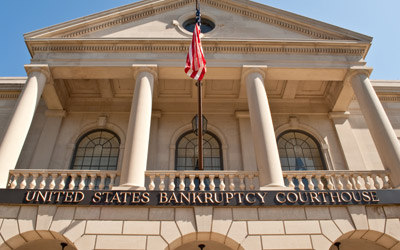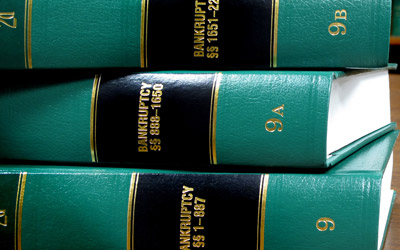FAQ'S
Student Loans and Bankruptcy
1. Can student loans be dischargeable in a bankruptcy?
Although it has happened in a few cases, filing for bankruptcy will most likely not eliminate your student loans. Moreover, due to recent changes in the bankruptcy code, the chances of obtaining a discharge on a student loan have even become even more difficult. The new bankruptcy code now provides that education loans issued from private-sector lenders such as Sallie Mae now have the same protection as Federally guaranteed student loans issued directly by the Department of Education. This protection applies only to debts incurred solely for the purpose of paying higher-education expenses for you, your spouse or your dependents.
If you have guaranteed student loans that have been consolidated, they will remain federally guaranteed, and it will be almost impossible to discharge them in a bankruptcy. Student loans are non-dischargeable, regardless of the age of the loan, unless the borrower can establish a “substantial hardship.” It is almost impossible to prove an undue hardship unless you are physically unable to work, and if there are no chances of you obtaining any type of gainful employment in the future. It is important to emphasize that outside of the realm of bankruptcy, there are still several other ways to deal with a defaulted student loan. A student loan can be rehabilitated, consolidated, or extended out, or discharged due to disability. Additionally, student loans may be unenforceable if school closed before you completed your course of study, or because of wrongdoing on the part of the school.
2. What is the legal standard to prove “undue hardship” under the United States Bankruptcy Code?
You can only establish a case of “undue hardship” if you have made a good-faith effort to repay your deb. However, in your current financial state (which is likely to continue for most of the repayment period), you cannot repay the loan and maintain a minimal standard of living. It is important to emphasize that bankruptcy courts have rarely granted hardship a discharges for student loans.
The bankruptcy courts use different tests to evaluate whether a particular borrower has shown an undue hardship. A common test is the Brunner test which requires a showing that 1) the debtor cannot maintain, based on current income and expenses, a “minimal” standard of living for the debtor and the debtor’s dependents if forced to repay the student loans; 2) additional circumstances exist indicating that this state of affairs is likely to persist for a significant portion of the repayment period of the student loans; and 3) the debtor has made good faith efforts to repay the loans. (Brunner v. New York State Higher Educ. Servs. Corp., 831 F. 2d 395 (2d Cir. 1987). Not all courts use this test. Some courts will be more flexible.
In the rare case wherein you may have a bona fide case of “undue hardship” you will have to file to file a legal action that is called an adversary proceeding in the bankruptcy court. An adversary case is basically a separate lawsuit that is filed within the context of your bankruptcy case. You will have to provide clear and convincing evidence of “undue hardship.”
Even if you sincerely believe you may have a bona fide case to prove an “undue hardship,” it is still up to the bankruptcy court to decide your case. The bankruptcy courts have in the vast majority of cases denied discharges for student loans. The main reason why the courts consistently deny discharges is because the Department of Education, the Federally guaranteed commercial lenders, and the non-profit lenders offer deferments, forbearance agreements, and other alternatives to address these type of hardships. Therefore, it is extremely difficult for a debtor to prove and “undue hardship,” and to ultimately obtain a discharge of a student loan in a bankruptcy.
The only way that a student loan can be discharged is by proving that repayment of the loan will create an undue hardship for the debtor/borrower and his family. If a debtor cannot prove a substantial hardship, then the most practical course may be to eliminate other debts that compete for the debtor’s precious dollars, or to provide a measure of peace during a chapter 13 case. Some courts will permit a debtor to separately classify student loans in a chapter 13, and then pay them a greater percentage than other unsecured debt. Alternatively, a debtor may attempt to either challenge the enforceability of the loan, or contest the amount of the loan. The student may also choose to contest any late fees or interest.
If you would like to discharge your student loans under this “undue hardship” exception, then you must file a separate adversary proceeding with the bankruptcy court, and then appear before the judge to explain your hardship. This is not an easy task! Therefore, if your student loans are major source of your financial troubles, then you have to carefully consider whether it is still worth it to file for bankruptcy.
If you can successfully prove undue hardship, then your student loan will be completely canceled. Filing for bankruptcy also automatically protects you from collection actions on all of your debts, at least until the bankruptcy case is resolved or until the creditor gets permission from the court to start collecting again.
Assuming you can discharge your student loan debt by proving hardship, then bankruptcy may be a good option for you. It is a good idea to first consult with a lawyer to understand other pros and cons associated with bankruptcy. For example, a bankruptcy can remain part of your credit history for ten years. Moreover, there are costs associated with filing for bankruptcy as well as a number of procedural hurdles. There are also limits on how often you can file for bankruptcy.
3. Under what exceptions can I have my student loan discharged?
As with all rules there is one exception: you can discharge a student loan in bankruptcy due to undue hardship. Undue hardship is defined as the permanent physical inability to work. You must prove in the bankruptcy court that:
a. You are physically unable to work;
b. You are likely to be unable to work for most of the loan term;
c. You have made a good faith effort to repay the debt; and
d. Paying it would prevent you, your spouse, and your dependents from maintaining a “minimal” standard of living.
If you believe you qualify under these guidelines, then you should consult with an experienced bankruptcy attorney for help filing an adversary proceeding as part of your bankruptcy case.
4. What other options do I have if I can’t pay off my student loans?
Student loans are contracts like any other loan and are subject to being challenged on the grounds of fraud, laches, and other contractual defenses. Moreover, student loans are not enforceable when the college or university has closed prior to the student completing his studies.
A debtor can also challenge the amount of the loan balance. In many cases, the colleges do not keep adequate records, and the student loan balance is often very inflated. A recurring problem is that the lender often keeps poor records of the loan and payment history. Moreover, many student loans have been transferred several times, and it is not clear just what is owed and whether all the additional charges are in accordance with law.
5. What are my repayment alternatives for my delinquent student loans?
If you are falling behind on your student loans and are concerned that the Department of Education will keep your tax refund, possibly garnish your wages or even sue you then you should examine all of your options. If bankruptcy is not an option for you, then you can consider other alternatives which include deferment of loans, forbearance agreements, renegotiating or refinancing, and possible consolidation of you student loans. Whatever you do, take action and try to address the situation before further damage is done to your financial condition.
Depending on how far in default you are on your student loan payments, you may be able to:
a. Work out a repayment plan with the student loan lender that stretches the payments out over a longer period, or provides for graduated payments that increase as your earning potential also increases.
b. Try to convince the lender to agree to defer repayment until your career and financial circumstances have improved.
c. Consolidate all your student loans into one loan that spreads the payments over a longer period of time, often at lower interest rates.
No matter what type of approach you should choose to deal with your student loans, it is strongly advisable to deal with these problems as soon as possible, so as to avoid paying more in the long run.
6. What other options do I have if I can’t keep up with my student loan payments?
If you are unable to make loan payments, some possible options may include:
a. Postponing the payments through deferment or forbearance programs;
b. Eliminating the loan altogether through loan cancellation;
c. Discharging the loan in bankruptcy; or
d. Consider other more affordable payment plans or a loan consolidation.
7. What should I do if the lender is trying to collect on an overinflated student loan balance?
If a lender is demanding payment for a student loan that you sincerely believe that you do not owe, then it’s best to resolve the situation before you end up in the bankruptcy court. The most typical situation is a miscalculation of the actual loan balance, especially if the loan has changed lenders multiple times. If you believe that the lender is requesting more than you owe, or hasn’t properly credited your payments, then you should write to them with your evidence. If the issue is not resolved, then a court can then intervene to determine the correct amount that you owe.
8. How can a file an application to discharge my student loans in bankruptcy?
Whether a student loan is discharged based on hardship is not automatically determined in the bankruptcy process. You must file a petition called an adversary proceeding to get a determination. If you already filed for bankruptcy, but did not request a determination of undue hardship, then you may reopen your bankruptcy case at any time in order to file this proceeding. You should be able to do this without payment of an additional filing fee.
9. What are some undue hardship examples?
It is up to the court to decide whether you meet the “undue hardship” standard. Here are a few examples of successful and unsuccessful cases.
a. A 58 year old I.R.S. employee making about $38,000/year was able to get his loans discharged. He had taken out the loans to attend a chiropractic program which he never completed. His overall expenses were about equal to his income. He was able to show that it was unlikely that his income would increase until his planned retirement at age 65. He was single with no dependents and had health problems. The court found that he had acted in good faith even though he had never made any voluntary student loan payments.
b. A college-educated married couple proved undue hardship and were able to discharge their loans. They both worked, but had income barely above poverty level. The court noted that the borrowers worked in worthwhile, although low-paying careers. One worked as a teacher’s aide and the other as a teacher working with emotionally disturbed children. Even with a very frugal budget, they had $400 more a month in expenses than income. Their expenses included $100 monthly tuition to send their daughter to private school. Relatives paid for most of this and the couple testified that they objected to the public school’s corporeal punishment policy. In agreeing to discharge the loans, the court also found that the couple had acted in good faith because they asked about the possibility of a more affordable repayment plan.
c. Not all courts are as sympathetic to borrowers who work in low-paying careers. For example, one borrower was denied a discharge because he worked as a cellist for an orchestra and taught music part-time. The court suggested that this borrower could find higher-paying work. Another court came up with the same result for a pastor. The court found that it was the borrower’s choice to work as a pastor for a start-up church rather than try to find a higher paying job.
d. A number of courts have granted discharges in cases where the borrower did not benefit from the education or went to a fraudulent school.
e. There have been mixed results when borrowers have tried to show that their financial difficulties will persist into the future. For example, one court found that a borrower’s alcoholism was not an insurmountable problem, but some borrowers have won these cases. In one case, a borrower’s testimony about her mental impairment, including evidence that she received Social Security benefits, was enough to convince the court of undue hardship. The court agreed with the borrower that her ongoing mental illness was likely to continue to interfere with her ability to work.
Even if you cannot prove undue hardship, you still might want to consider repaying your student loans through a chapter 13 bankruptcy plan.
10. Is every type of education debt so hard to discharge in bankruptcy?
No. Most, but not all, student loans will require proof of undue hardship in order to discharge in bankruptcy. You may be able to avoid this higher standard if you can show that your loans are not really “educational loans” as defined by the bankruptcy code. For example, the standard does not apply to payments for tuition or room and board if you did not receive an extension of credit. Also, the higher standard applies only if you went to an “eligible educational institution.” That means an institution that is eligible to participate in one of the government student financial assistance programs. Most, but not all, schools fit this category. You should consult a lawyer for more information about whether your loans meet these definitions.
11. If I was previously denied an undue hardship, can I renew my request?
Yes, if there has been a change in your circumstances.
12. Do I have to show that I have tried strategies other than bankruptcy in order to get a bankruptcy discharge?
This is not required, but many courts will want to see that you have tried other options such as the income contingent repayment plan. You should be prepared to discuss any strategies you have tried or if you haven’t tried anything, be prepared to explain why other options were not suitable for you






